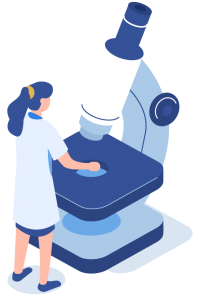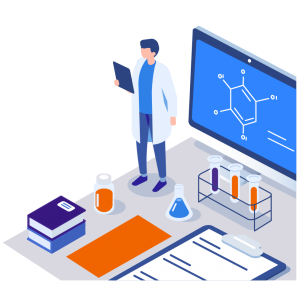At times when expectations regarding research have never been higher, as the COVID-19 pandemic dramatically reminds us everyday, are the information and data management systems that support researchers in their daily work really up to the challenges?
A study that Keralia conducted last year in partnership with the Science & Medicine Group, a leading business intelligence firm specializing in life sciences, is suggesting the opposite.

As an example, this is the number of full-time equivalents that are annually lost for research in Europe, due to the time wasted by researchers looking for and booking the instruments they need to run their experiments (Source: Keralia/Science&MedicineGroup Survey, July 2019).
This is a huge productivity loss, amounting to 3% of the overall Europe research capacity. How did we get to that number? Just by combining how frequently respondents in our panel have declared using shared instrumentation and technology platforms, which is daily for most of them, with the amount of time they have declared spending on average on such mundane and non-adding value activities like making a reservation to schedule their experiments.
And why is that? Because in most research organizations, researchers are faced with several different scheduling systems for instrument reservation. They often have to look up in various websites describing available facilities, and then juggle with manual workflows based on emails and spreadsheets. This is more or less how it looked like to book a hotel room 15 years ago, when consumer web services didn’t exist! No doubt that these workflows could be easily streamlined and automated with modern cloud-based technology.
A legacy of fragmented applications and data silos
Most research organizations, both in academia and industry, are still struggling to create an efficient work environment in their labs for 2 main reasons:
(1) Fragmented and poorly integrated information systems resulting from historic organizational silos. This situation makes it time-consuming for researchers to get what they need to do their work and to cooperate on projects. Data integration and workflows relying on manual re-entries are error-prone and slow down projects. Researchers are faced with the complexity of juggling with various applications and often terrible user interfaces.
(2) Experimental data is fragmented over various incompatible systems, leading to time-consuming consolidation work when results need to be documented and made available. Reproducibility, capitalisation on and sharing of knowledge are very challenging, and research teams’ productivity takes a serious hit.
When data is locked down in fragmented silos that are unable to communicate with each other, or can only communicate with expensive integration effort that is difficult to maintain over time, access to that data becomes a barrier for in-depth analysis. The opportunity to retrieve past experiences and apply that collective knowledge to current decision-making is often lost, or at least difficult, partial and time-consuming.
This situation is no longer up to the critical challenges and demanding expectations faced by modern research to accelerate science and drive innovation.

In recent years, modern research has been profoundly reshaped by 3 major and long-lasting trends:
● Modern research is no longer conducted in isolation, like in the days of Marie Curie or Louis Pasteur. There’s an ever growing number of projects run in cooperation between various, multidisciplinary and often geographically dispersed teams.
● Shared technology infrastructures play an increasing role in research projects (state-of-the- art scientific instrumentation, powerful computing and data management platforms). As one of the most advanced universities put it: “Excellence in research is intimately linked to excellence in capabilities, and that is what the core research facilities are all about. We enable high-impact research through state-of-the-art infrastructure”.
● New research paradigms are created by data-driven approaches enabled by the progress of big data technology, like “omics” in life sciences.
In this context of higher expectations and increased competitive pressure, research organizations are looking for solutions to unleash the potential of their teams. At Keralia, we believe that modern cloud technology can help.
A platform approach to transform work and unlock productivity traps
Cloud technology has enabled the transformation of most business functions in addition to transforming our personal lives. There are no reasons why research facilities and labs could not benefit from these technologies to unleash the true potential of their teams. Obviously we all know that efficient research is first and foremost a matter of smart people having smart ideas and looking at problems in fresh new ways. But we believe that smart people deserve better and smarter tools than what they currently have.

Modern cloud technology is easy to deploy and provides the kind of convergence that helps eliminate duplication of functionalities. A platform approach means built-in and genuinely integrated applications that eliminate complex and expensive integration work. Researchers can then work consistently with one single user interface to capture, access, and review their data. It becomes easier to share data and collaborate on projects. A platform approach can bring capabilities traditionally spread over multiple systems, like LIMS, ELN, resource management systems, etc., into one single system of record and action and ensure an end-to-end view on research activities.
We don’t mean that we should replace all applications and store all data onto one single cloud platform. This would clearly be out of reach and totally unrealistic in most organizations. At Keralia Tech for instance, we’re bringing together on one single platform, powered by ServiceNow’s cutting-edge cloud technology, with a consistent user experience, a set of lab management functionalities that enable:
- The use and management of technology infrastructures and core facilities, with the idea of making it as simple as it is in modern consumer web services.
- A collaborative ELN (Electronic Lab Notebook), that is fostering teamwork, cooperation and knowledge-sharing around experiments and projects, with intelligent automation of lab workflows and the recording and documentation of all experiments in one single place.
- The management of the portfolio of research programs and projects, with an end-to-end traceability of all resources involved (people, technology, consumables, etc.), along the entire research lifecycle from ideas to projects to experiments to data and knowledge, with built-in analytics and machine-learning predictive capabilities.
How a platform approach is improving research?
We believe there are several benefits deriving from a platform approach to modernize research information and data management systems:
- Create a modern user experience.
- Enable easy access to resources and data, anytime, anywhere.
- Foster collaborative work and knowledge sharing, without compromising security and data protection.
- Streamline and automate lab management workflows, eliminating time wasted on non-adding value activities.
- Provide an open architecture and standard API to facilitate integration with heterogeneous data sources.
- Enable built-in predictive models based on AI.
Want to learn more about our lab management collaborative cloud platform, visit the newLab page here.

